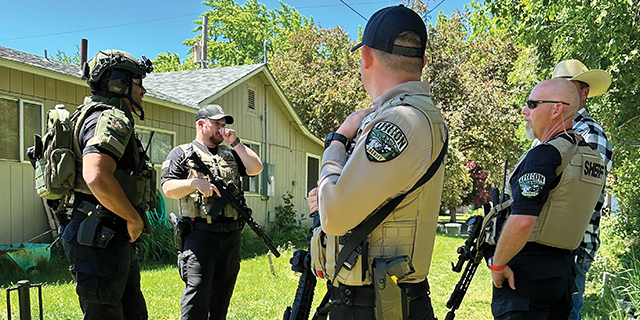At nearly 70, Echo farmer helps fight Elbow Creek Fire
Published 11:00 am Friday, August 6, 2021

- Signs along the fence at Wallowa High School Thursday, July 22, 2021, offer words of thanks and encouragement to firefighters working the Elbow Creek Fire.
ECHO — Lloyd Piercy was looking for a bit of adventure.
Piercy, who turns 70 on Aug. 12, spent the last few weeks helping fight the Elbow Creek Fire with a team of more than 400 firefighters in the Blue Mountains near Troy. A self-described adrenaline junky, he drove a bulldozer and cleared roads and cut fire breaks for fire crews.
But it had been more than two decades since he worked for a fire department near Moses Lake, Washington.
“It was kind of fun,” said Piercy, a longtime Echo resident and farmer who owns wineries outside of the town.
The fire has so far burned through roughly 22,960 acres in Oregon’s Grande Ronde River Valley, according to the Oregon Department of Forestry, which on Aug. 2 reported was 95% contained, up from 50% last week. The forestry department also reported its Type 1 Incident Management Team 3 handed management of the fire to a smaller Type 3 organization on Aug. 3.
After heading up to the town of Maxville, in Wallowa County, to help a friend protect his cows from the wildfires that had begun to sweep through the nearby mountains weeks ago, Piercy got a call from firefighters asking if he could bring his bulldozer to help them in the fight.
For more than a week, he said he was positioned at the heart of the fire, where the embers hopped over the roads and smoke trails ran up the hills among the steep canyons. But when he arrived, he realized most bulldozers were attached with more safety equipment than his. He felt somewhat out of his league, he said, but he added there were plenty of men around his age driving tractors.
“It’s a job for loggers,” Piercy said, “not farmers.”
One night, he got the opportunity to push a trail with his dozer through what he described as a hotspot.
“It was exciting,” he said. “I felt protected because of everyone around me, but I also know there’s a level of protection they can’t offer you in a fire. A lot of smoke.”
Piercy said he was fascinated by the way firefighters used science, weather patterns and other strategies to curb the spread of the blaze.
He also said he was pleased with the efficiency of supporters, noting the large meals his team received throughout the day, which he estimated to be thousands of calories daily. Each morning they received fresh coffee, hash browns, eggs, sausage, cold cereal, milk and juice. During the day, they ate sandwiches, vegetables, apples, canned tuna, bags of nuts and chips. Every night they received a salad and a warm meal.
“It’s logistically amazing,” he said.
Restaurants in towns up to two hours away over windy gravel roads fixed meals for the firefighters. Schools received funds for allowing firefighters to camp in their yards. Everybody in town who wanted to work and help out could get a job, he said. They were serious about saving their forests.
“It’s an industry,” he said. “It energizes those towns.”
Although he enjoyed the experience, Piercy said he doubts he’ll ever fight a fire like the Elbow Creek Fire again.
“I’ve realized,” he said, “this is probably a young man’s work.”




